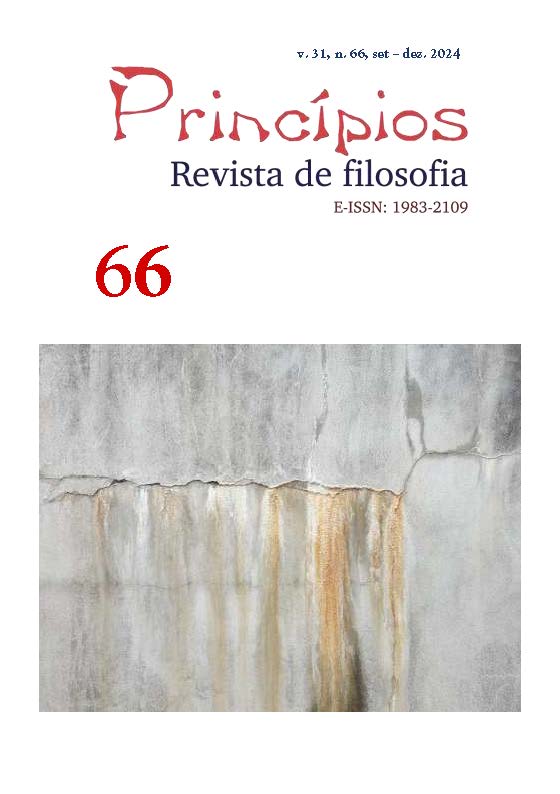Como a linguagem molda a memória episódica
uma proposta enativista radical
DOI:
https://doi.org/10.21680/1983-2109.2024v31n66ID34584Palavras-chave:
Memória episódica, Enativismo radical, Linguagem, Funções da memóriaResumo
O enativismo radical defende que cognição básica não é composta por computações de informações representacionais. Diante dessa proposta, a memória episódica (de eventos que alguém viveu) pode se tornar um desafio para essa abordagem da cognição humana especialmente porque parece intuitivo que memórias representam os eventos passados. Neste artigo, esse problema será abordado a partir da discussão acerca de como a linguagem humana molda a memória episódica. Será argumentado que a linguagem afeta as funções da memória episódica de modo a concedê-la uma função comunicativa e, como tal, representacional.
Downloads
Referências
ADDIS, D. R. Mental time travel? A neurocognitive model of event simulation. Review of Philosophy and Psychology, v. 11, n. 2, 2020, p. 233-259. https://doi.org/10.1007/s13164-020-00470-0
BARRETT, L. Beyond the brain: how body and environment shape animal and human minds. Princeton: Princeton University Press, 2011.
CARAVÀ, M. An exploration into enactive forms of forgetting. Phenomenology and the Cognitive Sciences, v. 20, 2021, p. 703-722. https://doi.org/10.1007/s11097-020-09670-6
CARDOSO, R.; OTTONI, E. The effects of tradition in problem solving by two wild populations of bearded capuchin monkeys in a probing task. Biology Letters, v. 12, 2016, p.20160604. https://doi.org/10.1098/rsbl.2016.0604
CARVALHO, E.; ROLLA, G. An Enactive-Ecological Approach to Information and Uncertainty. Frontiers in Psychology, v. 11, 2020, p. 1–11. https://doi.org/10.3389/fpsyg.2020.00588
CHENG, S.; WERNING, M.; SUDDENDORF, T. Dissociating memory traces and scenario construction in Mental Time Travel. Neuroscience and Behavioral Reviews, 2016. https://doi.org/10.1016/j.neubiorev.2015.11.011
CLARK, A. Being There: putting brain, body, and world together again. Cambridge: MIT Press, 1997.
DE BRIGARD, F. Is memory for remembering? Recollection as a form of episodic hypothetical thinking. Synthese, v. 191, n. 2, 2014 p. 155-185.
FIVUSH, R.; NELSON, K. Parent–child reminiscing locates the self in the past. British Journal of Developmental Psychology, v. 24, 2006, p. 235-251. https://doi.org/10.1348/026151005X57747
FIVUSH, R. The development of autobiographical memory. Annu Rev Psychol v. 62, 2011, p. 559–582. https://doi.org/10.1146/annurev.psych.121208.131702
FIVUSH, R. Family narratives and the development of an autobiographical self: social and cultural perspectives on autobiographical memory. London: Routledge, 2019.
FRAGASZY, D.; PERRY, S. Towards a biology of traditions. In: Fragaszy, D.; Perry, S. (eds.). The biology of traditions: models and evidence. Cambridge: Cambridge University Press, 2003.
FRAGASZY D. M.; BIRO D.; ESHCHAR Y.; HUMLE T.; IZAR P.; RESENDE B.; VISALBERGHI E. The fourth dimension of tool use: temporally enduring artefacts aid primates learning to use tools. Phil. Trans. R. Soc.B. v. 368, 2013, p. 20120410. http://doi.org/10.1098/rstb.2012.0410
HUFFMAN, M. A.; NAHALLAGE, C. A.; LECA, J. B. (2008). Cultured monkeys: social learning cast in stones. Current Directions in Psychological Science, v. 17, n. 6, 2008, p. 410-414. https://doi.org/10.1111%2Fj.1467-8721.2008.00616.x
HUTTO, D. D.; MYIN, E. Radicalizing enactivism: basic minds without content. Cambridge: MIT Press, 2013.
HUTTO, D. D.; MYIN, E. Evolving enactivism: basic minds meet content. Cambridge: MIT Press, 2017.
JABLONKA, E. Systems of inheritance. In: Oyama, S.; Griffiths, P. E.; Gray, R. D. (ed.). Cycles of Contingency: Developmental systems and evolution. Cambridge: MIT Press, 2003.
JABLONKA, E. Collective narratives, false memories, and the origins of autobiographical memory. Biol Philos v. 32, 2017 p. 839–853. https://doi.org/10.1007/s10539-017-9593-z
LALAND, K. N.; O’BRIEN, M. J. Cultural niche construction: An introduction. Biological Theory, v. 6, n. 3, 2011, p. 191-202. https://doi.org/10.1007/s13752-012-0026-6
MAHR, J.; CSIBRA, G. Why do we remember? The communicative function of episodic memory. Behavioral and Brain Sciences, v. 41, 2018, p. e1. https://doi.org/10.1017/S0140525X17000012
MAHR, J.; CSIBRA, G. The effect of source claims on statement believability and speaker accountability. Mem Cogn v. 49, 2021, p. 1505–1525. https://doi.org/10.3758/s13421-021-01186-x
MAHR, J.; MASCARO, O.; MERCIER, H.; CSIBRA, G. The effect of disagreement in children’s source performance. PLOS ONE, 2021. https://doi.org/10.1371/journal.pone.0249958
MICHAELIAN, K. Mental time travel: episodic memory and our knowledge of the personal past. Cambridge: MIT Press, 2016.
ROLLA, G. Radically Enactive High Cognition. Dissertatio, v. 47, 2018, p. 26–41. https://doi.org/10.15210/dissertatio.v47i0.12390
ROLLA, G. A mente enativa. Porto Alegre: Editora Fi, 2021. https://doi.org/10.22350%2F9786559173341
ROLLA, G. Do babies represent? On a failed argument for representationalism. Synthese v. 200, n. 278, 2022, p. 1-20. https://doi.org/10.1007/s11229-022-03728-5
ROLLA, G.; HUFFERMANN, J. Converging enactivisms: radical enactivism meets linguistic bodies. Adaptive Behavior, v. 30, n. 4, 2022, p. 345-359. https://doi.org/10.1177%2F10597123211020782
SCHOFIELD, D. P.; MCGREW, W. C.; TAKAHASHI, A.; HIRATA, S. Cumulative culture in nonhumans: overlooked findings from Japanese monkeys? Primates, v. 59, n. 2, 2018, p. 113-122. https://doi.org/10.1007/s10329-017-0642-7
STERELNY, K. Language, gesture, skill: the co-evolutionary foundations of language. Phil. Trans. R. Soc. B. v. 367, 2012, p. 2141-2151. https://doi.org/10.1098/rstb.2012.0116
STRIKWERDA-BROWN, C.; GRILLI, M. D.; ANDREWS-HANNA, J.; IRISH, M. (2019). “All is not lost” – rethinking the nature of memory and the self in dementia. Ageing Research Reviews, v. 54, 2019, p. 100392. https://doi.org/10.1016/j.arr.2019.100932
TULVING, E. Episodic memory and autonoesis: uniquely human? In: Terrace, H. & Metcalfe, J. (eds.). The missing link in cognition: origins of self-reflective consciousness. Oxford: Oxford University Press, 2005.
VAN WOERKUM, B. The evolution of episodic-like memory: the importance of biological and ecological constraints. Biol Philos v. 36, n. 11, 2021, p. 1-18. https://doi.org/10.1007/s10539-021-09785-3
Downloads
Publicado
Como Citar
Edição
Seção
Licença
Copyright (c) 2024 José Carlos Camillo

Este trabalho está licenciado sob uma licença Creative Commons Attribution-NonCommercial-ShareAlike 4.0 International License.
Autores mantêm os direitos autorais e concedem à revista o direito de primeira publicação, com o trabalho simultaneamente licenciado sob a Licença Creative Commons Attribution que permite o compartilhamento do trabalho com reconhecimento da autoria e publicação inicial nesta revista.
Termos da licença:
| Não Comercial (NC) | Os licenciados podem copiar, distribuir, exibir e executar a obra e fazer trabalhos derivados dela, desde que sejam para fins não comerciais. |
| Compartilha Igual (SA) | Os licenciados devem distribuir obras derivadas somente sob uma licença idêntica à que governa a obra original ou menos restritiva. |


 Português (Brasil)
Português (Brasil) English
English Español (España)
Español (España) Français (Canada)
Français (Canada)


